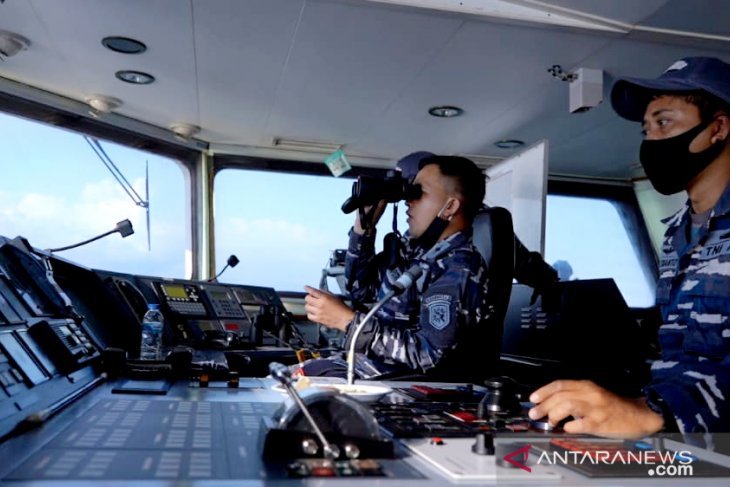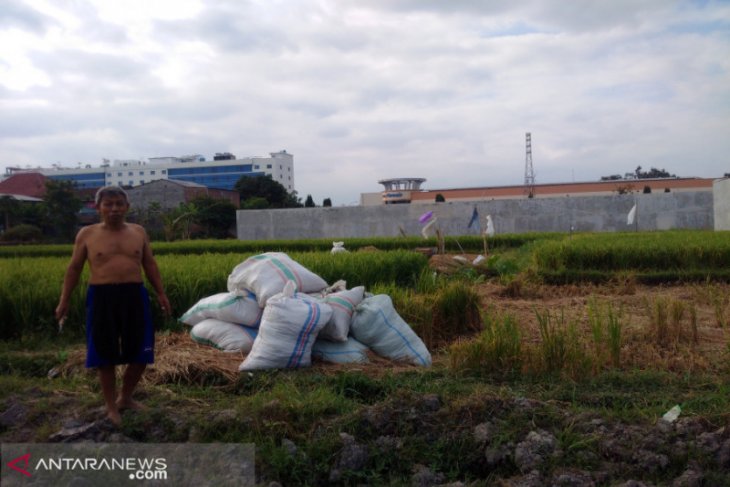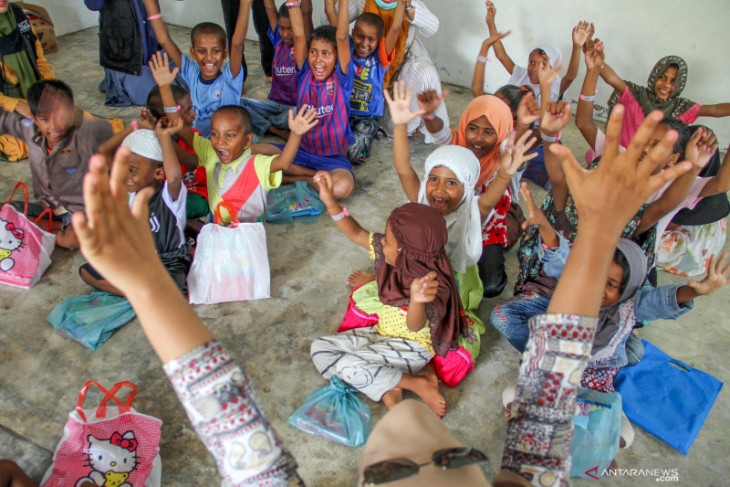Live Streaming
Program Highlight
Company Profile

Ani Hasanah
July
 A joint exercise is conducted by the Indonesian Navy and the Indonesian Air Force in Ambalat waters, near the border of Indonesia and Malaysia on July 11, 2020. .ANTARA Foto/ HO/Dispen Lantamal VI
A joint exercise is conducted by the Indonesian Navy and the Indonesian Air Force in Ambalat waters, near the border of Indonesia and Malaysia on July 11, 2020. .ANTARA Foto/ HO/Dispen Lantamal VI
The Indonesian Navy and Indonesian Air Force conducted an exercise near the border of Indonesia and Malaysia.
The Indonesian Navy deployed three warships -- KRI Diponegoro (DPN) -365, KRI P. Rengat (PRE) -711, and KRI Kakap (KKP) -811 -- while the Indonesian Air Force deployed a Boeing 737 aircraft from Squadron 5 of the Hasanuddin Air Force Base.
The tactical cooperation at the Indonesia-Malaysia border area was monitored by Sea Combat Group Commander of the Fleet Command II First Admiral Rahmat Eko Rahardjo from KRI Diponegoro-365 in the Ambalat waters on Saturday.
The exercise, involving the Navy and Air Force, was an enactment of a recommendation arrived at during a coordination meeting at the headquarters of the Air Force Operation Command II when KRI Diponegoro-365 docked at the Main Naval Base VI in Makassar.
The joint activity focused on forging sound tactical cooperation between the Navy and Air Force while conducting a joint military operation to safeguard the sovereignty of the Republic of Indonesia in the RI-Malaysia border region, particularly in the Ambalat Block waters.
The two-day exercise was also projected to help hone the capabilities and skills of the crew members of KRI DPN-365, KRI PRE -711, and KRI KKP -811 as well as to integrate tactical cooperation between Indonesian warships and aircraft in executing operational tasks. Tactical cooperation should constantly be established optimally between the three warships and aircraft to support the tasks of the Indonesian Navy in guarding the country's waters and the Indonesian Air Force in defending the country's air space, he emphasized.
Eko expounded that the exercise had taken a cue from past historical experiences that airplanes were crucial and effective weapons in sea operations akin to what had occurred during the Pacific war, specifically the Midway battle in 1942. (ANTARA)
Indonesian Vice President Ma'ruf Amin laid emphasis on materializing digital transformation in press and broadcasting as part of the major national development agenda to boost competitiveness at the global level.
"As a major national development agenda, digital transformation in broadcasting and press needs to be materialized. One of the priorities in accelerating digital transformation is digitization in the broadcasting sector," the vice president noted in his remarks during the presentation event of the Syiar Ramadhan Award by the Indonesian Broadcasting Commission (KPI) in Jakarta on Saturday.
There is a pressing need to alter the method of delivering information, from analog to digital, to stay abreast of the technological advancements, he affirmed.
Digital transformation will aid in solving the current problem of Indonesian television still lagging behind that of other countries.
Amin believes that digital television can also offer comfort to the audience through more optimal picture quality.
"The process of digitizing television, known as analog switch-off, or ASO, aims to offer broadcasting quality that is more efficient and optimal for the benefit of all Indonesian people," he expounded.
The vice president also reminded industries to adapt their businesses to the advancements in information technology.
"Disruptive technology necessitates industries in the broadcasting sector to adjust their business patterns to keep pace with progress in the digital era," he stated.
In addition to press and television broadcasting, digital transformation in radio broadcasting will offer optimal and efficient services to the public, he noted. (ANTARA)
July
 A farmer in Ngawen Hamlet, Maguwoharjo Village, Depok Sub-district, Sleman District, Yogyakarta Province, harvests rice in his paddy field. Local farmers expressed concerns over the Yogyakarta-Solo toll road project. ANTARA/Victorianus Sat Pranyoto
A farmer in Ngawen Hamlet, Maguwoharjo Village, Depok Sub-district, Sleman District, Yogyakarta Province, harvests rice in his paddy field. Local farmers expressed concerns over the Yogyakarta-Solo toll road project. ANTARA/Victorianus Sat Pranyoto
Central Java Governor Ganjar Pranowo revealed that construction of the 50-kilometer-long toll road connecting the cities of Yogyakarta and Surakarta in Central Java would commence in November 2020.
State-owned construction firm PT Adhi Karya confirmed in a report Pranowo received on Thursday evening that construction of the Solo-Klaten section will start from Prambanan, he notified local journalists in Semarang, Central Java, Friday.
Pranowo claimed to have no knowledge of when this toll road construction project would be completed though he projected its completion in two years.
Speaking in connection with the Solo-Yogyakarta toll road construction project, which is part of the Trans-Java Highway, Pranowo affirmed that he maintained sound coordination with the Yogyakarta provincial government.
Work on the toll road construction project continues amid the ongoing novel coronavirus pandemic.
The Public Works and Housing Ministry has highlighted that the work to construct 15 toll road sections in several Indonesian provinces would be completed this year, with five of them inaugurated in June and July.
"Toll road sections, spanning 297 kilometers, are ready to be inaugurated this year," Director General of Highways at the Public Works and Housing Ministry Trisasongko Widianto noted at a recent videoconference organized by the Indonesian Chamber of Commerce and Industry (KADIN).
The toll road sections ready for inauguration in June and July are Section 4 of Banda Aceh-Indrapuri-Blang Bintang, spanning 14 kilometers; Section 1-6 of Pekanbaru-Kandis-Dumai, reaching 131 km; Section 2 of Depok-Antasari, totaling six km; Section 1A of Cimanggis-Cibitung, spanning three km; and Section 1 and Section 2A of Manado-Bitung, reaching 21 km.
Widianto also drew attention to 12 toll road sections also ready to be auctioned this year.
The total length of those toll road sections reaches 669 kilometers, while their investment expenses were estimated to reach Rp242 trillion. The toll road sections ready to be auctioned include the Gedebage-Tasikmalaya-Cilacap, Access Road of Patimban, Jogja-Bawen, Solo-Yogyakarta-NYIA, and Semarang's Harbour Toll Road.
Public Works and Housing Minister Basuki Hadimuljono has earlier stated that nine other toll road projects were ready for the pre-qualification stage of auction in June and July 2020.
Furthermore, the ministry had formulated a plan to auction a multi-lane free flow (MLEF)-based cashless transaction of the toll road system project for the toll road sector, he remarked, adding that four toll road sections will become operational by June-end to support Indonesia's economic recovery efforts.
Since the first and second leadership terms of President Joko Widodo (Jokowi), infrastructure has been the prime focus, with notable extension of toll roads being testament to it.
The Public Works and Housing Ministry noted that during the first leadership term of President Jokowi, at least 941 kilometers of toll roads and 3,423 kilometers of national roads were constructed.
Work on the Trans-Java Highway, connecting the ferry port in Merak, Banten Province, to Surabaya, the capital city of East Java Province, is complete, thereby reducing the travel time and current logistics costs.
As part of the central government's prioritized development projects, the toll roads are not merely constructed in Java, but they are also built outside the island, such as Sumatra, Kalimantan, and Sulawesi.
In Sumatra Island, several sections of the Trans-Sumatra Toll Road have been completed, while the government is eyeing to complete entire sections in 2024. (ANTARA)
July

Rohingya children who are currently being sheltered in Aceh Province. (ANTARA FOTO/Rahmad/aww)
The Indonesian government on Friday afternoon shifted 99 Rohingya refugees, rescued by three Acehnese fishermen in June this year, from the old immigration office in Lhokseumawe, Aceh, to the city’s Meunasah Mee vocational training center.
Their move was carried out under strict implementation of COVID-19 protocols, Foreign Minister Retno Marsudi told journalists at a virtual press conference in Jakarta on Friday.
The refugees were rescued by three Acehnese fishermen, for humanitarian reasons, after their boat was stranded in the waters off Seunuddon, North Aceh, on June 24, 2020.
The Indonesian government has provided hygiene kits and logistics as well as health services to the refugees, the minister said.
It has also dispatched medical workers to take care of them at their new accommodation, she added.
Since July 5, 2020, officials from the United Nations High Commissioner for Refugees (UNHCR) have been registering the 99 refugees.
As of July 10, some 90 refugees have been registered by the UN agency. The registration process is expected to be completed by July 11.
During the registration, UNHCR officials found 25 of the refugee children were traveling without their parents. But, 13 of them were accompanied by their guardians, Retno Marsudi said.
"Twelve other children have been reunited with their uncles or aunts boarding the damaged boat," she said, adding that the Indonesian Red Cross (PMI), assisted by the International Committee of the Red Cross (ICRC) has conducted a healing program for them.
The PMI and ICRC also helped trace the children's family members so they could be reunited. Their relatives were tracked in Malaysia and Bangladesh, the minister added.
The EU's Foreign Affairs and Security Policy spokesperson, Nabila Massrali, has praised Indonesia's decision to provide a safe-landing and humanitarian assistance to the Rohingya refugees.
"The rescue of Rohingya refugees who face dire conditions is a tribute to international law and proves the generosity of the people and government of Indonesia," Nabila Massrali said in a statement on Thursday.
In cooperation with Indonesian authorities, the UNHCR, and other humanitarian organizations, the EU has pledged to mobilize humanitarian support to address the most urgent basic needs of the affected refugees. (ANTARA)


